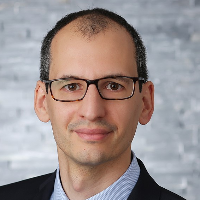Universität Regensburg
Pierre Koch

FOTO-STUDIO-HIRCH DARMSTADT
Anschrift:
Herr Prof. Dr. Pierre Koch
Universität Regensburg
Fakultät für Chemie und Pharmazie
Institut für Pharmazie / Lehrstuhl für Pharmazeutische/Medizinische Chemie II
Universität Regensburg
Fakultät für Chemie und Pharmazie
Institut für Pharmazie / Lehrstuhl für Pharmazeutische/Medizinische Chemie II
Straße:
Universitätsstrasse 31
Ort:
93053 Regensburg
Tel.:
0941 943-4827
E-Mail:
Leistungsprofil:
Praxisrelevante Forschungsgebiete:- Medizinische Chemie von Proteinkinasehemmstoffen
- Semi-synthese von Naturstoffen
- Neurodegeneration
- Immunsuppressiva
Praxisrelevante aktuelle Projekte:
- Design und Synthese von reversiblen Hemmstoffen der Glycogensynthasekinase-3beta
- Entwicklung von kovalenten Hemmstoffen der cJun-N terminalen Kinase 3
- Entwicklung von photo-aktivierbaren Kinasehemmstoffen
- Entwicklung von zellbasierten Kinasebindungsassays
Praxisrelevante Ausstattung/Messmethoden:
- Syntheselabore
- S1-Labore
- Ultrazentrifuge
- HPLC
- DC-MS
Publikationen:
- B. S. Hoffelner et al. Photocaging of Pyridinylimidazole-Based Covalent JNK3 Inhibitors Affords Spatiotemporal Control of the Binding Affinity in Live Cells. Pharmaceuticals 2023, 16, 264.
- S. Andreev et al. Addressing a Trapped High-Energy Water: Design and Synthesis of Highly Potent Pyrimidoindole-based Glycogen Synthase Kinase-3β inhibitors. J. Med. Chem. 2022, 65, 1283-1301.
- N. W. Tormählen et al. Design and Synthesis of Highly Selective Brain Penetrant p38α Mitogen-Activated Protein Kinase Inhibitors. J. Med. Chem. 2022, 65, 1225-1242.
- A. Botas et al. Genetic engineering in combination with semisynthesis leads to a new route for gram-scale production of the immunosuppressive natural product brasilicardin A. Angew. Chem. Int. Ed. 2021, 60, 13536- 13541.
- M. Reynders et al. Controlling the Covalent Reactivity of a Kinase Inhibitor with Light. Angew. Chem. Int. Ed. 2021, 60, 20178-20183.
- F. Heider et al. Pyridinylimidazoles as GSK3β inhibitors: the impact of tautomerism on compound activity via water networks. ACS Med. Chem. Lett. 2019, 10, 1407−1414.
Kooperationsangebot für die Wirtschaft / Praxis:
Bevorzugte Form der Kooperation:
- Beratung
- FuE
- Bachelor-/Master-/Diplomarbeit
- Doktorarbeit
Bestehende Kooperationen:
Mit Hochschulen:
Prof. Dr. Harald Groß, Universität Tübingen
Entwicklung neuer Immunsuppressiva
seit 2015
Prof. Dr. Stefan Knapp, Universität Frankfurt
Entwicklung von Kinasehemmstoffen
seit 2016
Zurück zur Liste
Falls dies ihr Profil ist, können Sie es hier nach dem Login bearbeiten.
